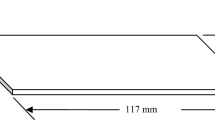Abstract
Injection moulding conditions such as melt temperature, mould temperature and injection time are important process parameters. Optimisation of these parameters involve complex patterns of local minima, which makes it very suited for Genetic Algorithm (GA). However, once a minimal region is identified during the search process, the GA method is not efficient, even sometimes impossible, in reaching its minimum. This is because GA is opportunistic not deterministic. The crossover and mutation operation may lead the search out of the identified minimal region. Gradient methods, on the other hand, are very efficient in this regard and can guarantee a local minimum, but not a global one. In this paper, a strategy of using a hybrid of both methods in injection moulding conditions optimisation is proposed, so as to exploit their respective advantages. The hybrid optimisation process is elaborated and a case study is conducted to test the effectiveness and efficiency of the strategy and its implementation algorithm. The optimisation results from the hybrid approach are compared with those from the GA method alone to demonstrate the improvement.







Similar content being viewed by others
References
Bernhardt EC, Bertacchi G,Moroni A (1983) Molding and cost optimisation. In: Bernhardt EC (eds) CAE for Injection Molding. Macmillan, New York, pp 222–273
Pandelidis I, Zou Q (1990) Optimisation of injection moulding design. Part 2: moulding conditions optimisation. Polym Eng Sci 30(15):873–882
Choi GH, Lee KD, Chang N, Kim SG (1994) Optimisation of process parameters of injection moulding with neural network application in a process simulation environment. Ann CIRP 43:449–452
Lee BH, Kim BH (1995) Optimisation of part wall thickness to reduce warpage of injection-molded parts based on the modified complex method. Polym Plastics Technol Eng 35(5):793–822
Jan TC, O’Brien KT (1991) Architecture of an expert system for injection molding problems. SPE ANTEC, pp 124–443
Kameoka S, Haramoto N, Sakai T (1993) Development of an expert system for injection molding operations. Adv Polym Technol 63:403–418
Shelesh-Nezhad K, Siores E (1997) An intelligent system for plastic injection molding process design. J Materials Processing Technol 63:458–462
Kwong CK, Smith GF, Lau WS (1997) Application of case based reasoning in injection moulding. J Material Processing Technol 63:463–467
Kim SJ, Lee K, Kim YI (1996) Optimisation of injection moulding conditions using Genetic Algorithm. In: Proceedings of SPIE—the international society for optical engineering, Society of Photo-Optical Instrumentation Engineers, Bellingham, WA, USA 2644:173–180
Lee KS, Low CY, Rahman M, Zhang YF (2001) A genetic algorithm based process planning system for mould base. Int J Comput Appl Technol 14(4, 5, 6):190–203
Moldflow (1999) Moldflow plastic insight release 1.1 online documentation
Britton GA, Lam YC, Deng YM (2002) Specification model: a first step towards automatic interpretation of injection moulding CAE results. Int J Adv Manuf Technol 20(11):833–843
Goldberg DE (1989) Genetic algorithms in search, optimisation, and machine learning. Addison-Wesley, Reading
Acknowledgements
This project was supported by the Academic Research Fund, Ministry of Education, Singapore and Moldflow Corporation.
Author information
Authors and Affiliations
Corresponding author
Rights and permissions
About this article
Cite this article
Lam, Y.C., Deng, Y.M. & Au, C.K. A GA/gradient hybrid approach for injection moulding conditions optimisation. Engineering with Computers 21, 193–202 (2006). https://doi.org/10.1007/s00366-005-0004-8
Received:
Accepted:
Published:
Issue Date:
DOI: https://doi.org/10.1007/s00366-005-0004-8




